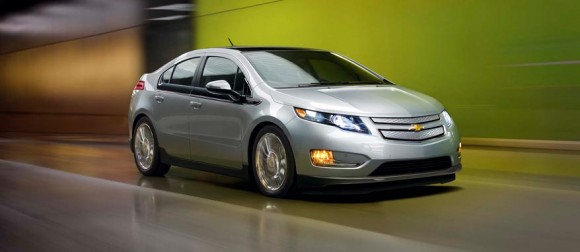 photo courtesy of chevrolet.com
photo courtesy of chevrolet.com
Although the Chevy Volt focuses on efficiency, it doesn’t sacrifice style.
With Chevrolet, Ford, Mitsubishi and Nissan all ready to sell their own electric automobiles to the public, 2011 is gearing up to be the year of the electric car. These vehicles are likely to improve the image of the electric car as they look good, go fast and go far.
With the first cars expected to be delivered to auto dealerships next month, the Chevrolet Volt will be the initial salvo of 2011’s electric car line up. The Volt is a four door compact sedan that’s expected to cost $41,000, but cost drops to $32,780 after a federal tax credit, and comes with a 100,000 mile warranty. The Volt’s battery only has a 40 mile range and Chevrolet estimates most people can make their daily commute within those 40 miles costing them $1.50 of electricity per day. As a hybrid electric car, the Volt features a gas engine generator to be used whenever the battery becomes depleted or for trips of more than 40 miles in length. The Volt looks just as sleek as any sedan and many a passerby would be hard-pressed to identify it as electric thanks to the gas tank flap just in front of the front driver’s door.
Charging the Volt may be even more cost efficient as it can be set to charge during “off-peak” hours, leading to lower power usage. A full charge of the Volt takes about 10 hours to complete with a standard 120-volt line or 4 hours using a dedicated 240-volt line.
The Volt also features an iPhone app called OnStar MyLink that allows car owners to check the battery charge level, available driving range, tire pressure, lock & unlock their car remotely, remotely start the car and control the air conditioner. The app also enables users to customize how and when their Volt charges in addition to setting up alerts through text message or e-mail as a reminder to charge their Volt, when charging is complete or if charging has been interrupted.
The Nissan Leaf will also be making its debut next month as the first fully electric car from a major automobile manufacturer in years. Priced as low as $25,280 after a federal tax credit of up to $7,500, the Leaf is the least expensive electric vehicle hitting the roads in 2011. With a 100 mile range on each charge and speeds of up to 90 mph, the Nissan Leaf gets the best range and speeds without spending anywhere from $50,000 to $100,000 on a higher end model. The Leaf’s onboard computer will display its current range radius on a map and will be able to tell its drivers if they will be able to reach their desired destination based on the state of its charge and plotting of nearby charging stations along the route.
Mitsubishi will be making its foray into the U.S. electric car market with its i-Miev next fall. Looking somewhat like a Smart car, the Mitsubishi i-Miev is arguably the most golf-cart-esque electric car launching next year. Although the i-Miev is currently on sale in Japan, its American cousin will be slightly larger and have a redesigned interior. Like the Nissan Leaf, the i-Miev is expected to have an 100 mile range and will set back buyers an estimated $30,000.
Ford will also be debuting an electric car in 2011 with a modified version of its current Focus model. The Ford model is estimated to have a 100 mile range when it ships in fall of 2011. Ford has yet to announce a price.
Toyota is expected to debut the results of its $50 million investment in electric car start-up Tesla Motors next week at the Los Angeles Auto Show. While Tesla is known for electric cars being sold to the tune of $50,000 and $100,000, their partnership with Toyota is rumored to bring a more affordable vehicle modeled after the RAV4 line of cars.
Although a roster of viable electric cars may be making their debuts in 2011, some are simply trying improve gasoline and ethanol fuel efficiency for those willing to wait for one. The X Prize Foundation, originally set out to encourage private space travel by awarding a $10 million prize to the first privately financed team that could build and fly a three-passenger vehicle into space, has set out to spark a revolution in something a little more humble: cars. After three years of racing to build super-efficient automobiles to reach at least 100 mpg for the Progressive Insurance Automotive X Prize’s $10 million award, the teams involved underwent the first round of judging in September with some vehicles attaining a stunning 187.6 mpg.
While many of the X Prize vehicles will likely stay concepts for many years to come, 2011 might just bring an electric car revival.
